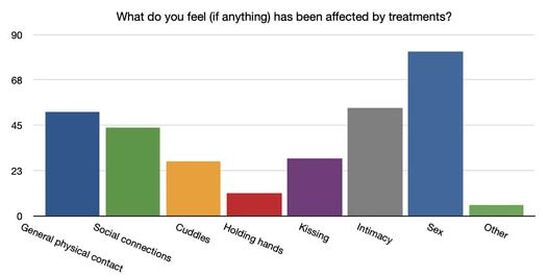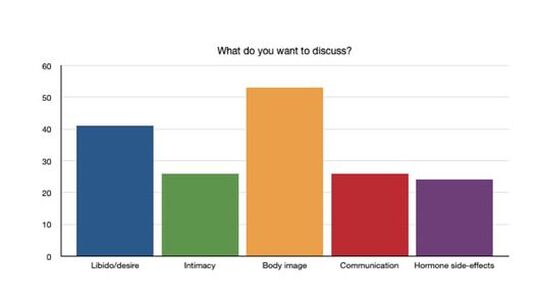Intimacy & cancer: Here’s what over 250 patients have to say.
I’m an intimacy and cancer specialist (I can hear inside your head saying “you’re a what?”) and yes, it’s a thing, but only because I made it so!
When I realised through personal experience and through my clients how little intimacy and connection was addressed during cancer treatments, I wanted to take action. I’m a sexuality specialist for people with chronic illness and disability and I am also fighting stage 3 cancer, so it really was a no-brainer for me to turn my focus towards oncology.
I wanted to learn about the experiences of others regarding this taboo, yet oh so important topic. So, I sent out a survey to people diagnosed with cancer or their partners, asking about their experiences regarding intimacy, sexuality and the healthcare system during treatments. From the 261 people who completed this survey, I thought I’d share some of my findings to provide insights and learnings into this generally unspoken topic.
Please note, this is not official data, but information from a small surveyed group. I am not a researcher or a professional number cruncher, so please be kind to my attempts at analytics!
Let's get started!
One of the first questions in the survey was:
Q: "Have any of your relationships suffered since diagnosis?"
63.98% of the people surveyed noted that their intimate relationships (partner/lover/spouse/dating life) had suffered, with the next form of relationship impacted being friendships. Other relationships were also impacted including family and co-workers, however the connections involving intimacy were the highest rated.
When I realised through personal experience and through my clients how little intimacy and connection was addressed during cancer treatments, I wanted to take action. I’m a sexuality specialist for people with chronic illness and disability and I am also fighting stage 3 cancer, so it really was a no-brainer for me to turn my focus towards oncology.
I wanted to learn about the experiences of others regarding this taboo, yet oh so important topic. So, I sent out a survey to people diagnosed with cancer or their partners, asking about their experiences regarding intimacy, sexuality and the healthcare system during treatments. From the 261 people who completed this survey, I thought I’d share some of my findings to provide insights and learnings into this generally unspoken topic.
Please note, this is not official data, but information from a small surveyed group. I am not a researcher or a professional number cruncher, so please be kind to my attempts at analytics!
Let's get started!
One of the first questions in the survey was:
Q: "Have any of your relationships suffered since diagnosis?"
63.98% of the people surveyed noted that their intimate relationships (partner/lover/spouse/dating life) had suffered, with the next form of relationship impacted being friendships. Other relationships were also impacted including family and co-workers, however the connections involving intimacy were the highest rated.
|
A following question then was:
Q: "What do you feel (if anything) is affected during/after treatment?"
A huge 81% of people surveyed stated that sex was impacted during and after treatment, with intimacy, general physical contact and social connections following around the 50% mark. It would seem that according to this group of people, this is a subject that a very high portion of people are affected by, so let’s see how often it was clinically addressed with this group of people. |
Q: "Did any healthcare workers initiate conversations with you during cancer treatment, about intimacy and sexuality?"
Out of this group, 68% of the responses were a ‘no’. So, what appears to be a topic that affects most people (sex/intimacy) during treatments, it's also one that is not commonly addressed by healthcare workers. When then asked to specify the themes that people or their partners going through treatment wanted a healthcare worker to chat to them about was, the top 4 were:
We know out of this group of people surveyed, that just over a quarter of healthcare professionals brought up sexuality and intimacy during treatments, but how many patients or partners brought up the topic themselves? Which leads me to my next question:
Q: "Did you ever initiate a conversation with your treating team regarding intimacy & sexuality?"
73% of the people surveyed said they did not and below are the top 5 reasons why:
For the people that did initiate conversations regarding sexuality and intimacy, there was a large portion who had great experiences from the healthcare workers who openly and calmly answered questions and discussed the desired topics with them. Another portion of this group were told by healthcare workers when asked, that intimacy and sex related issues were “not important” or “not a priority”, so they did not try to bring up the topic again.
From these questions so far, it seems we have a topic that is important to a majority of people, which around only a third of healthcare workers address and almost three quarters of the patients don’t want to ask about it. No wonder it goes unaddressed!
So what is it exactly that people want to ask? I’ll be honest, this last question had results that really surprised me.
Out of this group, 68% of the responses were a ‘no’. So, what appears to be a topic that affects most people (sex/intimacy) during treatments, it's also one that is not commonly addressed by healthcare workers. When then asked to specify the themes that people or their partners going through treatment wanted a healthcare worker to chat to them about was, the top 4 were:
- The most popular by far, was specifically the side-effects hormone treatments have on sexuality and how to manage them.
- Next was being notified of the sexual side-effects and challenges from ANY treatments, including surgery, radiotherapy and especially chemotherapy.
- Reduced desire and sexual drive was the next most important issue people wanted discussed.
- And lastly, a warning about the reduction of intimacy in partnerships and how to navigate that.
We know out of this group of people surveyed, that just over a quarter of healthcare professionals brought up sexuality and intimacy during treatments, but how many patients or partners brought up the topic themselves? Which leads me to my next question:
Q: "Did you ever initiate a conversation with your treating team regarding intimacy & sexuality?"
73% of the people surveyed said they did not and below are the top 5 reasons why:
- They were too embarrassed or awkward.
- They did not think of it and some in retrospect, would have liked their treating team to bring it up.
- They did not know what/how to ask.
- The topic was not a priority during treatments.
For the people that did initiate conversations regarding sexuality and intimacy, there was a large portion who had great experiences from the healthcare workers who openly and calmly answered questions and discussed the desired topics with them. Another portion of this group were told by healthcare workers when asked, that intimacy and sex related issues were “not important” or “not a priority”, so they did not try to bring up the topic again.
From these questions so far, it seems we have a topic that is important to a majority of people, which around only a third of healthcare workers address and almost three quarters of the patients don’t want to ask about it. No wonder it goes unaddressed!
So what is it exactly that people want to ask? I’ll be honest, this last question had results that really surprised me.
|
Q: "If you could ask an intimacy & cancer specialist about anything, what would it be?"
|
And this is where I was delightfully surprised. The next two themes people wanted to ask a specialist about, at an almost exact tie, were communication and intimacy. As a sexuality specialist and educator in the community I often say that “communication is the number one sex move”. I can almost hear the groans of frustration when I say it in workshops, so seeing this come up as a primary concern for people had me do a double-take.
4. Regarding intimacy, people specified they wanted to discuss the loss of intimacy during and after treatment, including ways to work at maintaining even just a little during the more stressful times.
5. The fifth most important theme was navigating the side-effects of hormone treatments and induced menopause from chemotherapy.
When I released this survey out on social media I’ll admit that I had many assumptions as to what I would find, some of which were confirmed and others completely changed. I hope from this survey you have gained insights, perhaps you feel you are not alone and that your concerns are valid. I hope you feel you can speak up, to ask the questions and know that your intimacy and your connections are worth it.
I would like to thank everyone who took the time to share their experiences in this survey and thank you to all of the medical professionals and healthcare workers who work so hard for our survival. I understand that healthcare workers are prioritising keeping people alive, perhaps we can start to see intimacy and relationships as the things that keeps us wanting to live.
You are not alone!
...
If you're after information on all things intimacy and cancer, see the Intimacy & Cancer Book, 'A Better Normal'
If you're impacted by cancer and need support regarding the more 'intimate' struggles we face, join the private facebook group: 'Intimacy and Cancer' for support with thousands of people diagnosed with cancer, from over 40 countries.
4. Regarding intimacy, people specified they wanted to discuss the loss of intimacy during and after treatment, including ways to work at maintaining even just a little during the more stressful times.
5. The fifth most important theme was navigating the side-effects of hormone treatments and induced menopause from chemotherapy.
When I released this survey out on social media I’ll admit that I had many assumptions as to what I would find, some of which were confirmed and others completely changed. I hope from this survey you have gained insights, perhaps you feel you are not alone and that your concerns are valid. I hope you feel you can speak up, to ask the questions and know that your intimacy and your connections are worth it.
I would like to thank everyone who took the time to share their experiences in this survey and thank you to all of the medical professionals and healthcare workers who work so hard for our survival. I understand that healthcare workers are prioritising keeping people alive, perhaps we can start to see intimacy and relationships as the things that keeps us wanting to live.
You are not alone!
...
If you're after information on all things intimacy and cancer, see the Intimacy & Cancer Book, 'A Better Normal'
If you're impacted by cancer and need support regarding the more 'intimate' struggles we face, join the private facebook group: 'Intimacy and Cancer' for support with thousands of people diagnosed with cancer, from over 40 countries.
Take me back to the cancer resources main page: Click Here
|
If you have benefited from ConnectAble Therapies free resources, you can show support by making a donation.
|
|
#connectionandcancer #connectabletherapies #sexandcancer #sexaftercancer #intimacyandcancer #intimacyaftercancer #theintimacyot #connectabletherapies


